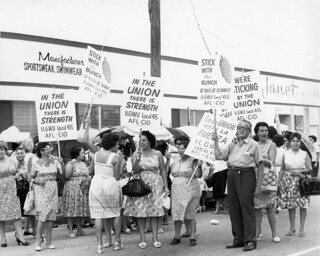Bruce Raynor is president of the Sidney Hillman Foundation and president Emeritus of Workers United, the garment/textile workers union
Probably the most successful clothing lifestyle designer in American history is Ralph Lauren, or Ralph Lipshitz before he felt his name was too Jewish-sounding for the preppy style he created. In the early years of his remarkable success, Lauren created ties for men that were manufactured in a New York City factory that employed members of the Amalgamated Clothing and Textile Workers Union. When he expanded to mens’ suits in the 1970’s and 1980’s he opened a unionized factory in Lawrence, Massachusetts employing several hundred men and women. Ralph became wealthy and created an array of products for men and women. His women’s products were mostly made in New York by members of the International Ladies Garment Workers Union (ILGWU).
Lauren became so successful that in the 1990’s he expanded to a complete lifestyle collection that included dressy and casual clothing and accessories for men, women, and children, home furnishings, and many other products. However, as he grew wealthier he began to move his production out of unionized factories in the United States to third world countries where he could employ low paid workers, mostly women, in Latin America and Asia. Ralph’s tie workers, who launched his career, were the first to lose their jobs in the mid 1990’s. Soon he closed his suit factory in Massachusetts and moved those jobs to sweatshops in underdeveloped countries. Finally he opened a non-union distribution center in North Carolina and fired his warehouse workers.
Today Ralph is one of the wealthiest men in the industry with a fortune estimated at 7.5 billion dollars. This year he won the right to design and supply the uniforms for the United States Olympic Team competing in London. Who else but our country’s greatest designer with his red, white, and blue themed brand should outfit the best athletes our country has to offer? Who better than Ralph Lipshitz, a DeWitt Clinton High School graduate from the Bronx?
However, even when it came to the U.S. Olympic uniforms, Lauren had them designed in New York and manufactured in China. Most every country entered the Olympic Stadium dressed in apparel made in their country with pride. Did you see the South Africans, Chinese, and Italians with beautiful clothing made by their fellow countrymen and women? Only the United States marched to the tune of low wages and exploited workers.
This controversy spurred a backlash including an online petition with thousands of people calling for the uniforms to be replaced with ones made in American factories by workers treated fairly. Senator Harry Reid, the Majority Leader of the Unites States Senate, called for the uniforms to be burned in a bonfire. Seven Senators have introduced legislation to require that Olympic uniforms for the U.S. team be produced domestically.
The fact is that there are U.S. factories that make the same products with better quality and by union-represented workers in Illinois, New York, Pennsylvania, Maryland, and several other states. Ralph Lauren made a choice to turn his nose up at the men and women in these communities in order to enrich himself. Americans should do the same to Ralph and refuse to buy his products until he remembers who took him from the Bronx to the top of the world.
Baseball in America
In contrast, the current season of baseball holds up a different example. Those hundreds of professional athletes who are playing Major League Baseball in stadiums across North America are wearing uniforms produced in Bangor, Pennsylvania in factories employing more than 500 workers who are represented by the clothing workers union, Workers United. These workers are paid decent wages, have family health insurance, and defined benefit pensions. In fact, every official baseball uniform worn by players or sold in stores is made in Bangor.
This didn’t happen by accident. The clothing workers union teamed up with the Major League Baseball Players Association (the baseball players union) and Major League Baseball to require that the company producing uniforms did so with U.S. workers under decent working conditions. As baseball has prospered, the number of workers has grown and a modern factory was constructed in Bangor.
During this recession and its prolonged unemployment involving millions of American workers, the issue of U.S. manufacturing jobs has risen to prominence. Manufacturing jobs have always paid wages above the national average. These jobs are essential to a successful economy because they add real value. A sensible national policy that is being advanced by President Obama to encourage domestic manufacturing is essential to putting Americans back to work. The Olympic fiasco can achieve some good if it reminds business leaders like Ralph Lauren and the rest of us that a country has to create policies that create jobs for its citizens. Patriotism and national pride require more than waving flags and wearing the national colors.









